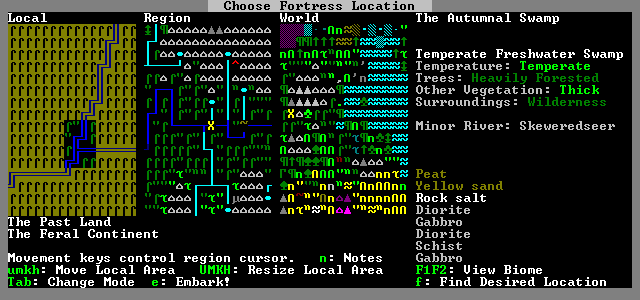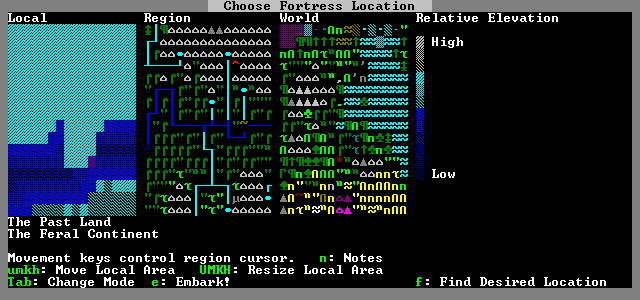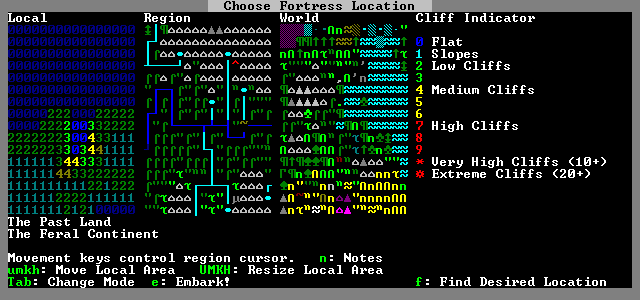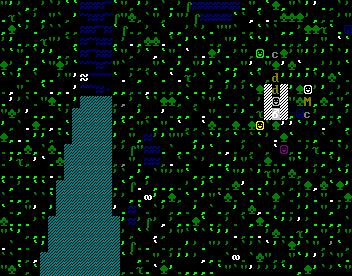- v50 information can now be added to pages in the main namespace. v0.47 information can still be found in the DF2014 namespace. See here for more details on the new versioning policy.
- Use this page to report any issues related to the migration.
Difference between revisions of "v0.31:Waterfall"
| (14 intermediate revisions by 7 users not shown) | |||
| Line 1: | Line 1: | ||
{{av}} | {{av}} | ||
{{Quality|Exceptional}} | {{Quality|Exceptional}} | ||
| − | + | ||
| − | A waterfall is any point on a | + | A '''waterfall''' is any point on a [[river]] where water descends z-levels. Waterfalls may be natural or engineered. |
==Benefits of waterfalls== | ==Benefits of waterfalls== | ||
| − | Waterfalls generate | + | * Waterfalls generate [[mist]], which gives dwarves happy [[thought]]s. |
| + | ** Consider building a path under your waterfall with [[grate|floor grates]] directly under your waterfall and building a [[activity zone|meeting area]] or [[dining hall]] behind the waterfall. This will result in a nice, constant shower of positive emotions for your dwarves as they waddle through the glorious mist like happy elves. This also provides a nice constant shower to rinse your dwarves clean of [[blood]], [[vomit]], and [[mud]], which may [[syndrome|save the fortress from a plague someday]]. | ||
==Drawbacks of waterfalls== | ==Drawbacks of waterfalls== | ||
| − | Waterfalls will hamper your {{ | + | * Waterfalls will hamper your [[framerate]]. |
| + | |||
| + | * Waterfalls also have [[fun|interesting]] [[flood|effects]] on [[water pressure]]. | ||
| + | ** Depending on what you are [[trap design|trying to do]], this may actually count as a benefit. | ||
| + | |||
| + | =Locating a natural waterfall= | ||
| + | While the site finder does not include waterfalls, the [[embark]] screen can still be used with fair accuracy to locate waterfalls for your fortress. Press {{k|Tab}} until you reach the relative height and cliff indicator screens, and follow rivers. Waterfalls are often located where two rivers intersect and the smaller river empties into the larger one. Some particularly tangled segments of rivers can result in maps with two or more waterfalls. Here, an example of a stream flowing into a minor river is shown. | ||
| + | |||
| + | |||
| + | <center>[[File:WaterfallLocation_2.png]]</center> | ||
| − | |||
| − | + | In most [[region]]s the relative height of rivers will be the same. This is generally the darkest color, to indicate the lowest point. However, there are places where the relative heights along rivers will change. This is a good hint as to the presence of a waterfall. Generally, the greater the difference in color, the more impressive the waterfall will be. This is of course only a relative measure: the same difference in color implies wildly greater levels of scenic grandeur in [[mountain]]s than it does in flatlands. The largest waterfalls are found where streams drop into major rivers near the mountains. | |
| − | |||
| − | |||
| − | + | <center>[[File:Waterfall_3.png]]</center> | |
| − | |||
| − | The cliff indicator tool can be used to further confirm the presence of waterfalls, and to fine tune your embark area. In this example, the embark area straddles the tiles labeled as having cliffs with a height of four. The "flat" tiles labeled as | + | The [[cliff]] indicator tool can be used to further confirm the presence of waterfalls, and to fine tune your embark area. In this example, the embark area straddles the tiles labeled as having cliffs with a height of four. The "flat" tiles labeled as dark blue zeroes are the southern extension of the stream: for the purposes of the [[site finder]], all segments of the stream are on the same height, including the cliff at the end. The exact location of the waterfall will be in the zero sandwiched between the fours. You can use this knowledge to fine-tune your embark area to your favorite size. In this case, a 3x3 map could be centered on the bottom zero tile, and a fortress built around the majestic centerpiece. |
| − | |||
| − | Here is the end result of the example waterfall search: seven dwarves milling around in the dirt, and the stream Bristleditches the Messianic Vomit falling five z-levels as it spills into | + | <center>[[File:WaterfallLocation_1.png]]</center> |
| + | |||
| + | |||
| + | Here is the end result of the example waterfall search: seven dwarves milling around in the dirt, and the stream Bristleditches the Messianic Vomit falling five z-levels as it spills into the minor river Skeweredseer, a teeming source of [[alligator]]s, [[longnose gar]], and [[carp]]. | ||
| + | |||
| − | [[File:WaterfallLocation_4.png]] | + | <center>[[File:WaterfallLocation_4.png]]</center> |
| + | =Building an artificial waterfall= | ||
| + | By creating a stream of falling water with screw pumps or making use of a river or brook on a high z-level, you can engineer a waterfall to take advantage of the happiness it causes. Such waterfalls can become highly complex indeed. | ||
| − | [[ | + | Artificial waterfalls make excellent happiness generators, and are best placed in populated or well-[[traffic|trafficked]] areas like [[dining room]]s or main hallways. |
| + | |||
| + | If your map has a [[cavern]] that you feel confident building in, consider building a sewage system that runs into the cavern and off the edge of the map. This way you can simply build a channel from a river to a specific area within your fortress and then have the water pour into the drain. If you are feeling creative, create running water outlets across your fortress, all which run into your sewer system. | ||
| + | |||
| + | == Design example== | ||
| + | |||
| + | [[File:Simple_waterfall.jpg|thumb|right|A simple artificial waterfall, water position before starting pump]] | ||
| + | |||
| + | Three [[z-level]]s are necessary to do this. On the bottom is the [[reservoir]] of water. The middle layer is the [[screw pump]] and the "[[meeting hall]]" where dwarves will gather to enjoy the mist. On top is a narrow corridor that connects the pump chamber to the hole through the ceiling of the meeting hall. Under this hole is a [[grate]] that connects to the reservoir and prevents dwarves from falling in and drowning. | ||
| + | |||
| + | The pump pulls water out the reservoir and pushes it up above the meeting hall. The water falls down through the grate, back into the reservoir. | ||
| + | |||
| + | A more complicated Dwarven waterfall can be seen [http://mkv25.net/dfma/movie-193-artificalwaterfall here] at DFMA in movie form. A mistake to note: Water is hitting the side of the bridges, which splashes the water around and can knock dwarves in. | ||
| + | |||
| + | |||
| + | |||
| + | {{World}} | ||
Latest revision as of 01:24, 30 June 2012
| This article is about an older version of DF. |
A waterfall is any point on a river where water descends z-levels. Waterfalls may be natural or engineered.
Benefits of waterfalls[edit]
- Waterfalls generate mist, which gives dwarves happy thoughts.
- Consider building a path under your waterfall with floor grates directly under your waterfall and building a meeting area or dining hall behind the waterfall. This will result in a nice, constant shower of positive emotions for your dwarves as they waddle through the glorious mist like happy elves. This also provides a nice constant shower to rinse your dwarves clean of blood, vomit, and mud, which may save the fortress from a plague someday.
Drawbacks of waterfalls[edit]
- Waterfalls will hamper your framerate.
- Waterfalls also have interesting effects on water pressure.
- Depending on what you are trying to do, this may actually count as a benefit.
Locating a natural waterfall[edit]
While the site finder does not include waterfalls, the embark screen can still be used with fair accuracy to locate waterfalls for your fortress. Press Tab until you reach the relative height and cliff indicator screens, and follow rivers. Waterfalls are often located where two rivers intersect and the smaller river empties into the larger one. Some particularly tangled segments of rivers can result in maps with two or more waterfalls. Here, an example of a stream flowing into a minor river is shown.

In most regions the relative height of rivers will be the same. This is generally the darkest color, to indicate the lowest point. However, there are places where the relative heights along rivers will change. This is a good hint as to the presence of a waterfall. Generally, the greater the difference in color, the more impressive the waterfall will be. This is of course only a relative measure: the same difference in color implies wildly greater levels of scenic grandeur in mountains than it does in flatlands. The largest waterfalls are found where streams drop into major rivers near the mountains.

The cliff indicator tool can be used to further confirm the presence of waterfalls, and to fine tune your embark area. In this example, the embark area straddles the tiles labeled as having cliffs with a height of four. The "flat" tiles labeled as dark blue zeroes are the southern extension of the stream: for the purposes of the site finder, all segments of the stream are on the same height, including the cliff at the end. The exact location of the waterfall will be in the zero sandwiched between the fours. You can use this knowledge to fine-tune your embark area to your favorite size. In this case, a 3x3 map could be centered on the bottom zero tile, and a fortress built around the majestic centerpiece.

Here is the end result of the example waterfall search: seven dwarves milling around in the dirt, and the stream Bristleditches the Messianic Vomit falling five z-levels as it spills into the minor river Skeweredseer, a teeming source of alligators, longnose gar, and carp.

Building an artificial waterfall[edit]
By creating a stream of falling water with screw pumps or making use of a river or brook on a high z-level, you can engineer a waterfall to take advantage of the happiness it causes. Such waterfalls can become highly complex indeed.
Artificial waterfalls make excellent happiness generators, and are best placed in populated or well-trafficked areas like dining rooms or main hallways.
If your map has a cavern that you feel confident building in, consider building a sewage system that runs into the cavern and off the edge of the map. This way you can simply build a channel from a river to a specific area within your fortress and then have the water pour into the drain. If you are feeling creative, create running water outlets across your fortress, all which run into your sewer system.
Design example[edit]
Three z-levels are necessary to do this. On the bottom is the reservoir of water. The middle layer is the screw pump and the "meeting hall" where dwarves will gather to enjoy the mist. On top is a narrow corridor that connects the pump chamber to the hole through the ceiling of the meeting hall. Under this hole is a grate that connects to the reservoir and prevents dwarves from falling in and drowning.
The pump pulls water out the reservoir and pushes it up above the meeting hall. The water falls down through the grate, back into the reservoir.
A more complicated Dwarven waterfall can be seen here at DFMA in movie form. A mistake to note: Water is hitting the side of the bridges, which splashes the water around and can knock dwarves in.
Worlds | |
|---|---|
